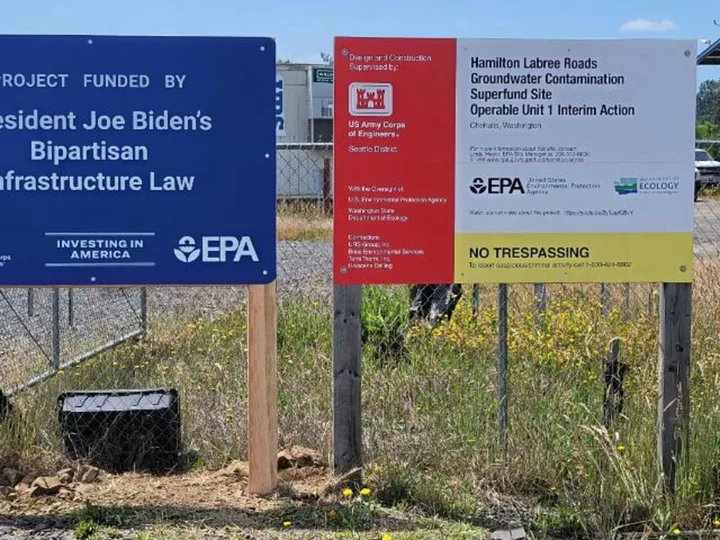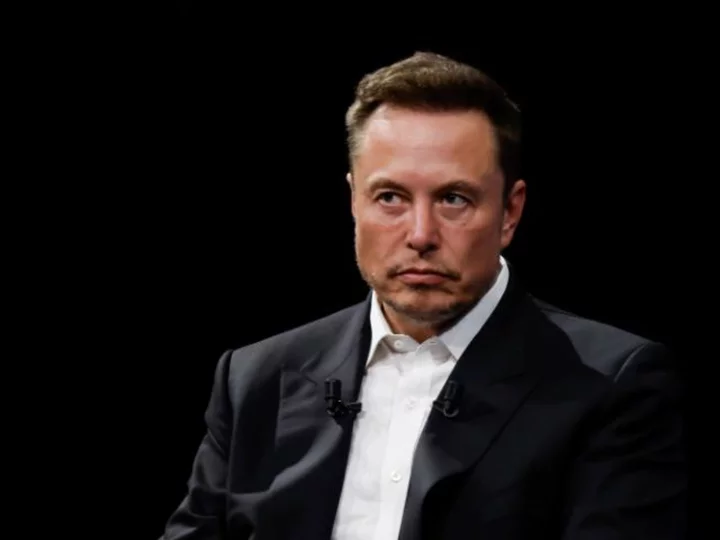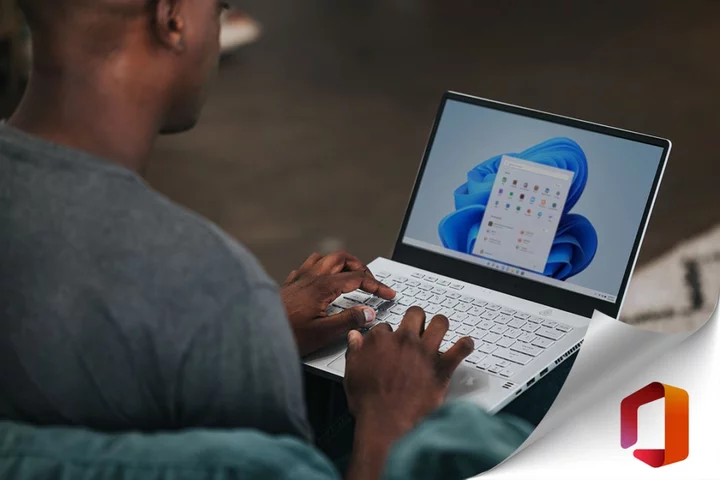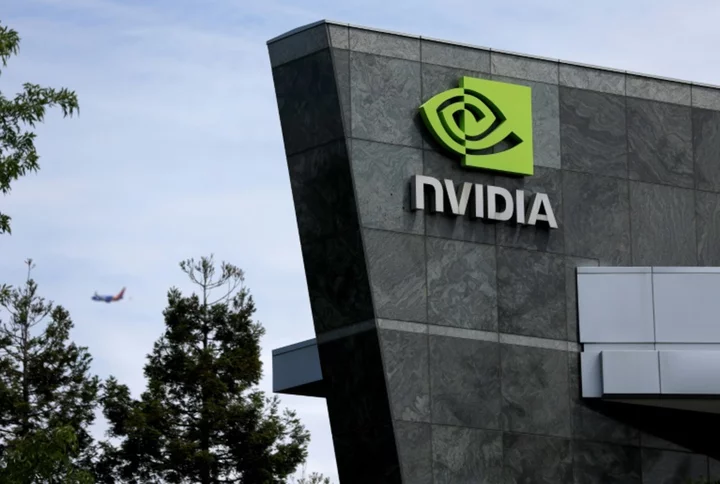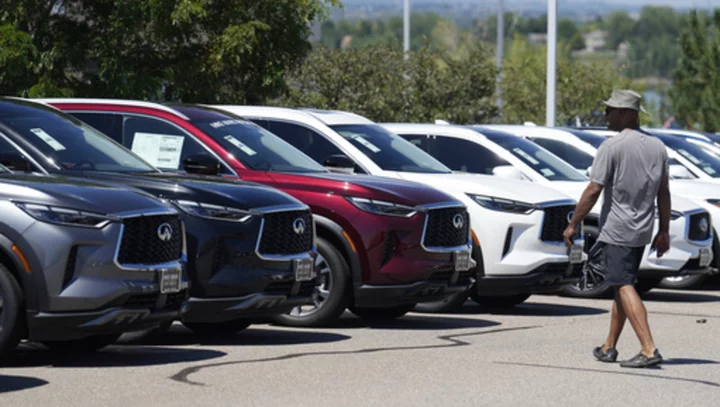The Montgomery Locks and Dam near Pittsburgh is in the midst of a $857 million upgrade to ensure water levels in the Upper Ohio River are high enough for large cargo ships to pass through.
On a grassy roadside nearby, a white sign announces who's behind the work: "Project funded by President Joe Biden's Bipartisan Infrastructure Law."
For Biden, taking credit for an improving economy — including the jobs and growth made possible by the trillion-dollar public works law — has become a political imperative, one that will help determine whether he is reelected to a second term next year. Even as Democrats relish a recent hot streak of positive economic data, they acknowledge it won't benefit Biden politically unless voters begin to associate him with the improvements.
The White House office responsible for the infrastructure signage says there will be hundreds of thousands of signs claiming credit for projects made possible by the 2021 law, many of which are just now getting started. The same sign is posted near a road improvement project in Wisconsin and a border crossing in Arizona. Even where the work isn't obvious, there are signs. At a large empty field in Montana, a sign announces a Superfund site is being cleaned up thanks to the law.
It's all now collected under the banner of "Bidenomics," the blanket term adopted by the White House to take ownership of an improving economy ahead of the 2024 election.
Despite the improvement, polls continue to show wide disapproval of how Biden has handled the economy, to the frustration of the White House and its Democratic allies. Even as inflation slows, wages rise, hiring continues apace and recession fears ease, many Americans are still pessimistic about the economy and blame the president.
"It's understandable that Americans' perception of the economy operates with somewhat of a lag to real economic data," said Brian Deese, who until February served as director of Biden's National Economic Council. "The recent uptick in consumer sentiment is promising and heartening. If we continue to see progress in that direction, I would expect it would start to flow through more clearly into approval numbers as well."
Progress in changing Americans' sour economic perceptions has so far been slow. About half of Americans think the economy is still in a downturn and getting worse, according to a CNN poll released Thursday. Only 37% approve of Biden's handling of the economy -- a figure that has held roughly steady since last fall.
Three-quarters of Americans describe economic conditions in the country as poor, according to the CNN poll -- despite better than expected economic growth, and experts from the Federal Reserve to Goldman Sachs to Bank of America now saying a recession is no longer likely in the next year.
Voters have more concerns, though, than just their bank accounts. Biden's age continues to worry voters, according to polls. Enthusiasm for a second Biden term remains low among Democrats. And the national mood has been dampened by years of political and economic turmoil.
"Post Covid, people are in a bad mood. They're not very convinced and optimistic about anything because there's a level of PTSD, certain level of depression," a Democratic strategist said. "It's not because of Joe Biden. It's just because of the times."
On Friday, government data showed the economy added 187,000 jobs in July, slightly lower than expected but still a sign of robust hiring. The report showed the unemployment rate ticking down to 3.5%, near a historic low.
The jobs report is the latest in a string of positive economic data. Last week, government figures showed the economy grew at a 2.4% rate in the April-through-June period, a faster pace than in the first three months of the year and well above economists' expectations.
Consumer sentiment tracked by the University of Michigan rose 13% in July, the second straight month of improvement. And wages are now rising faster than prices.
White House aides acknowledge it will take time both for Americans to start feeling the effects of a stronger economy and to associate Biden with those improvements. But they see recent data as encouraging tailwinds.
"We're finally getting the kind of clouds-clearing that we need for people to actually hear that message and see what we're doing," a senior administration official said. "I think communication in this day and age is always tough, it's a fractured media environment. And that makes it even more necessary for us to keep repeating it."
Speaking in Maine last week, Biden suggested Republicans were looking elsewhere for attack lines — including investigations of his family — now that economic conditions were improving.
"Republicans may have to find something else to criticize me for now that inflation is coming down. Maybe they'll decide to impeach me because it's coming down," he said at a textile factory in Auburn, the signs behind him all labeled "Bidenomics: Made in America."
What might serve as a laugh line for Democrats is rooted in some reality: Even significant economic improvements may not shift political winds in an increasingly partisan climate. CNN's July polling found 70% of Democrats approved of Biden's handling of the economy, compared to just 5% of Republicans. And while increased optimism was apparent among respondents who identified as Democrats, an overwhelming majority of Republicans were still pessimistic.
"There is a tough set of questions around, 'Are there structural factors at play that will make it more challenging for POTUS to convince voters that the gains are under his stewardship?'" a former senior administration official said.
Biden's advisers believe the attempt to brand the president's economic accomplishments has been working — slowly, they acknowledge — to shift perceptions of his record, citing the uptick in consumer sentiment. Yet Biden's economic approval remains anemic, meaning the effort that began earlier this summer with podium speeches at shipyards, factories and plants around the country will continue into the fall.
Biden, Vice President Kamala Harris, and several other top administration officials launched another travel blitz this week -- that will include stops by the president next week in Arizona, New Mexico, and Utah -- highlighting key legislative accomplishments and touting positive economic data across the country.
So far, the administration has leaned on its own Cabinet to deliver its message. But Biden should take a page from the playbook of President Barack Obama, another former official said, and leverage private-sector executives to talk up the economy.
"The Biden surrogate playbook doesn't exist," the former official said, suggesting leaders from manufacturing, clean energy and semiconductor industries could be effective cheerleaders for Biden's policies and the investments they've spurred.
Obama faced similarly negative economic perceptions at a similar point in his first term, but the economy was in much worse shape. Only 26% of Americans approved of his handling of the economy in August 2011, a month in which unemployment stood at 9.1% and the US economy created zero jobs.
He went on to handily win reelection the following year.
"Obama had to change people's minds about where he started from and the bad hand that he was dealt and what he did to improve the economy, and Biden has that story on steroids," the Democratic strategist said. "He has a story about turning the economy around no president has."
White House aides and advisers acknowledge there's still time for that story to change, for momentum to slow, or for new risks to appear.
"The bottom line is, we don't have a history of looking at economic cycles that follow global pandemics, that follow major shocks to our supply chains and our energy markets because of geopolitical forces," another current senior administration official said. "There's a lot that's unusual about this economic cycle."
With 15 months until Election Day, the Biden administration remains most focused on sustaining the momentum -- and the message.
"I think they're pretty comfortable playing the long-ish game on this," the first former senior administration official said. "They are asking themselves the question, 'Where are we going to be a year from now?'"

